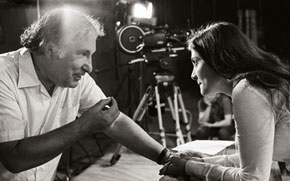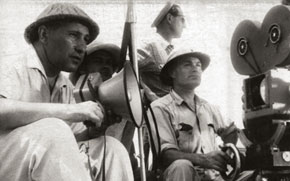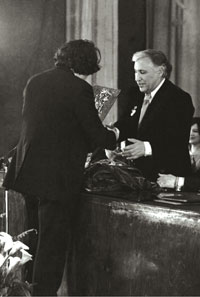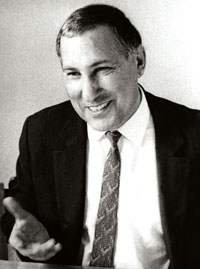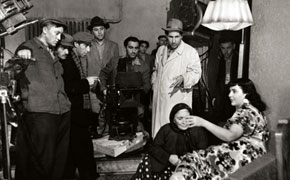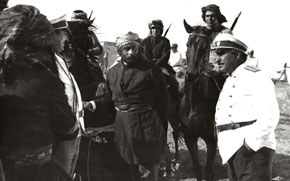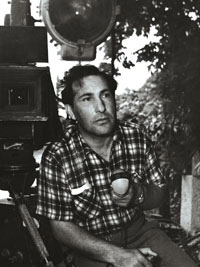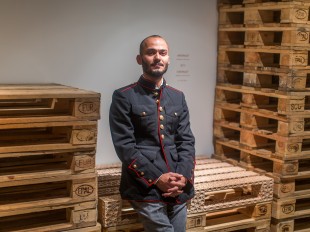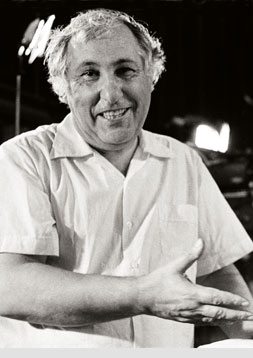 Pages 98-106
Pages 98-106by Aydin Kazimzadeh
“A true professional should be able to see the bright, positive aspects to what is happening in society. A film director should base his work on the idea of the script, on the ideal it suggests. Filming superficial, dull subjects is not truly creative. The basis of every film should be people, their aims, desires and struggles. A true professional should open up a new path to art, give a lead to the next generation, as the professional is ahead of his time.”
These are the words of film director, actor and script writer Ajdar Ibrahimov, who was awarded the titles People´s Artist of the USSR and of Azerbaijan. They are remarks about film-making in general but apply equally well to Ajdar Ibrahimov himself. Ibrahimov was a true citizen, ahead of his time, otherwise he would not have made such valuable films as Two Lads From the Same Block, His Great Heart, The Stars Do Not Fade, Heart Stories, My Love and My Sorrow and The Strange Person.
Ajdar Ibrahimov said that wise people had played a major role in his life and choice of career. He was bolstered by his determination, his desire for creative expression and, most importantly, his faith in himself.
Formative years
Ajdar Mutallim Ibrahimov was born in 1919 in Ashgabat and received his basic education there. His love of the arts took the young Ajdar to the Musical Drama Theatre in Ashgabat, where he worked as an actor, before he went on to study at the Ashgabat Drama School.
When the Soviet Union joined the Second World War, the whole country was involved in one way or another in the war effort. In 1942 Ajdar Ibrahimov was sent to the front, where he acquitted himself with honour. Recollecting those years, Ajdar Ibrahimov said: “The Front became my first school of life. The war taught me so much, involved me in incomprehensible events. On the hard roads of war I encountered both Good and Evil and the struggle between them. Life and death were no longer abstract concepts for us young people. Consequently we had something new to say on screen too.”
After the war, in 1952, Ajdar Ibrahimov graduated from the directing faculty of the All-Union State Institute of Cinematography (Mikhail Romm´s class). The film Peace Fighter, which was his degree work, defined his approach to film. The young director created an inspired reflection on screen of the life and work of the great Turkish poet Nazim Hikmet. After graduation, the young director was offered the opportunity to stay and work in Moscow. However he returned to Ashgabat and worked in a local film studio where he made documentary films including Firuza and East of the Caspian Sea. He became the director of a newsreel entitled Soviet Turkmenistan.
Turkish poet Nazim Hikmet
In 1954 Ajdar Ibrahimov arrived in Baku. The young director was still fascinated by the great personality of Nazim Hikmet and his inexhaustible work and in 1957 with Igor Gurin directed the feature film Two Lads from the Same Block. The events of the film take place in a Near Eastern country. The film, a co-production of the Baku and Maksim Gorkiy film studios, is a convincing portrait of the struggles of ordinary life. It confirms the storming talent of Nazim Hikmet and the directors´ ability to bring such important themes to the screen.
Ajdar Ibrahimov had a personal and creative friendship with Nazim Hikmet. He thought it an honour to make films both about the poet and based on his work: “Nazim Hikmet is an outstanding 20th century figure,” Ajdar Ibrahimov said. “We were connected both by personal friendship and by our work. My degree work Peace Fighter, which I wrote while studying at the All-Union Institute of Cinematography, was devoted to Nazim Hikmet. He was an extremely kind person. In 1951 I met him and we became friends. Not long afterwards, on the basis of his script I shot the film Two Guys From the Same Block. Nazim Hikmet was a fighter always and everywhere and was strongly committed to his own ideals.
The ideas of his works were deep and the images bright. Although he was a purely Turkic poet, his works were universal. I wouldn´t be wrong to say that my meetings with Nazim Hikmet, his outlook on life, our joint steps in cinema, all this was reflected in my work.”
Ajdar Ibrahimov directed his first major work in 1958, the film His Great Heart, which had a screenplay by Imran Qasimov. The film covers three periods – the pre-war era, the Second World War and the post-war peace – and concerns people´s ethics, their work and their ability to withstand hardship. The film criticizes unscrupulous, thoughtless types who look for a comfortable lifestyle and easy money.
After that, the Vietnamese period began in Ajdar Ibrahimov´s work. In the 1950s and 60s he worked in Vietnam, helping to develop film-making in the Vietnamese Democratic Republic. He established a school of national cinema in Hanoi and taught and supervised workshops for film directors and actors. Ajdar Ibrahimov´s teaching and filmmaking in Vietnam were rewarded with the country´s highest awards. After returning home he published three books based on his experiences in Vietnam - Seen in Vietnam, Burning Sun and Girl from the Tan Tribe.
Historical epics
After Vietnam Ajdar Ibrahimov continued his work for the Mosfilm studio in 1962 and did not lose touch with Azerbaijan either. He directed major, historical epics, The Twenty-Six Baku Commissars in 1966 and The Stars Do Not Fade in 1971, which were co-productions between the Mosfilm and Azerbaijanfilm studios.
The Twenty-Six Baku Commissars gives a Soviet interpretation of the dramatic events of 1918. However, the historical and revolutionary theme does not diminish its artistic value at all and the film retains its artistic interest to this day.
Filming took place in tough conditions: the big crowd scenes were shot in 45-degree heat, make-up melted, moustaches and beards came unstuck, hot wind seared the skin and threw sand in the actors´ eyes. Eighteen derricks were specially constructed outside Baku for the film shoot; the metal derricks which could withstand a ten-point storm, were covered with wood. Around them an artificial oil lake was created. It took three months to construct the set, but it was burnt and reduced to ashes within minutes. This is how Ajdar Ibrahimov filmed the oil wells, set on fire by the British as they withdrew.
Every morning in Baku outriders of the State Automobile Inspection would clear the roads for 250 horsemen, sporting big astrakhan hats with sabres at their sides. They were followed by old phaetons on which Baku´s millionaires used to travel. The film crew would bring up the rear in modern buses.
Selecting actors was a major task. Some 70 actors appeared in one scene in the film. The Twenty-Six Baku Commissars received the second prize for the best historical film at the Third All-Union Film Festival in Leningrad in 1968.
The feature film The Stars Do Not Fade has the complex, multidimensional figure of Nariman Narimanov at its heart: teacher, doctor, writer, actor and director, politician and statesman. The film used memoirs and short stories to reveal the story of Nariman Narimanov, his era and his character.
Russian film director Alexander Alov said of the film: “The Stars Do Not Fade consists of several short stories which show the many sides to Narimanov´s character and work. The film shows Narimanov as someone who is multi-talented to a surprising degree - he is an outstanding state and party figure, an educator, a writer, a diplomat and a doctor. He faithfully served the interests of the working people to the end and did not spare the fire in his soul.
The Stars Do Not Fade is interesting from the cinematic point of view and looks good. The film is impressive for its unity of style and the talented work of its whole creative team. Ajdar Ibrahimov should be singled out amongst the makers of the film; he has a bright, individual style and is developing with each film he makes.”
Lyrical films
Ajdar Ibrahimov made a wide range of films but whatever their topic or genre, whether they were national epics or kitchen-sink dramas, his work was always enjoyed and remembered.
The film Heart Stories, shot in 1973 by the Mosfilm studio, was about the work of ambulance teams and showed the director´s ability to work in a lyrical style. In this film Ajdar Ibrahimov used deft touches to portray the tender feelings of honest, sensitive people who feel compassion for the suffering of others.
He went more deeply into this subject in his next film, The Strange Person (1978), which was made for television. With a heavy heart the director told the bitter consequences of the immorality and treachery that dominated society. The film is based on the work of Nazim Hikmet of the same name, which touches on important moral issues.
During his long years in cinema Ajdar Ibrahimov became a well-known professional director not only in the former USSR, but also abroad. His films enjoyed success on the world´s screens. When the USSR´s Mosfilm and Turkey´s Tughrafilm decided to make a co-production My Love, My Sorrow, both sides were happy to entrust direction to Ajdar Ibrahimov. This is the fourth of Ibrahimov´s films based on the work of Nazim Hikmet. It is a spectacular screen version of the poet´s play, Legend of Love.
Actor, script writer and teacher
As well as being an excellent director, Ajdar Ibrahimov was also a talented script writer. He wrote the screenplay for the comedy Qaynana (Mother-in-Law); with Margarita Malayeva wrote the screenplay for The Strange Person; with Isa Huseynov and Mikhail Maksimov wrote the screenplay for The Twenty-Six Baku Commissars, and on his own wrote the screenplay for My Love, My Sorrow. He also acted in his own films: he played Rasulov in His Great Heart, Begulov in The Stars Do Not Fade and the merchant Rajab in The Strange Person.
For over 20 years Ajdar Ibrahimov taught direction and acting at the Moscow State Institute of Culture. He said of his teaching: “When you feel that you are needed by other people, you give pleasure by passing on knowledge and experience, by preparing your students for your favourite work, you open before them a new, beautiful world, you feel happy and this happiness cannot be surpassed.”
The Azerbaijani people remember Ajdar Ibrahimov as a happy cinema professional. Ajdar Ibrahimov died in Moscow on 20 September 1993 after a long illness. He was 74. He is buried in his homeland, in the Avenue of Honour in Baku.
